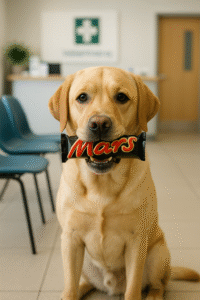Picture this: you’re sitting in the cosy waiting room of your trusted neighbourhood vet clinic, chatting with the friendly receptionist about how Bella’s been doing since her last check-up. The walls are covered with adorable photos of local pets, and everything feels wonderfully personal and independent. But here’s the kicker – there’s a very good chance that your “local” vet is actually owned by a massive corporation you’ve never heard of.
It sounds like some conspiracy theory, but most UK vet practices aren’t the independent, vet-run businesses we imagine them to be. Instead, they’re part of huge corporate empires. But how does this affect dog owners?
TLDR: Most UK vets that look independent are actually owned by one of six big companies, including ones backed by Mars (yes, the chocolate and pet food giant) and Nestlé. These groups—IVC Evidensia, CVS, Medivet, VetPartners, Vets4Pets (Pets at Home), and Linnaeus (Mars)—control over 60% of UK vet practices.
Table of Contents
Why it matters:
- You may pay more due to centralised pricing and upselling.
- Pet food recommendations could be biased by corporate ownership.
- Choice is shrinking, with few truly independent vets left.
- The vet you trust might be driven by shareholder profits, not just pet care.
The Corporate Giants Hiding in Plain Sight

So who owns 60% of all UK vet practices?
IVC Evidensia: The Massive Player You’ve Never Heard Of
If your vet practice has that lovely, independent feel but seems surprisingly well-equipped, there’s a decent chance it’s part of IVC Evidensia’s empire. We’re talking about over 1,000 UK clinics and hospitals here, with the company operating about 2,500 sites across 19 countries and boasting a nearly €12.3 billion valuation.
Here’s what’s clever about their approach: they let practices keep their local names. So “White Cross Vets” or “Meadowview Veterinary Clinic” sounds delightfully independent, doesn’t it? Meanwhile, the company is primarily owned by EQT, with minority stakeholders including Silver Lake and – wait for it – Nestlé.
The Competition & Markets Authority (CMA) has repeatedly raised red flags about IVC buying up multiple practices in specific areas, which could be driving up prices for pet owners like you.
CVS Group: The Aggressive Expander
CVS Group owns around 500 veterinary sites, plus labs, crematoria, referral services, and 24/7 emergency care. Once backed by private equity and now AIM-listed, they’re continuing their aggressive expansion strategy.
Like IVC, they’re smart about branding – letting practices keep their local names while building integrated service ecosystems behind the scenes. But here’s the telling part: CVS shares plunged after the CMA announced their investigation. Why? Because investors are worried that regulation could seriously eat into their profit margins.
The Others in the Mix
Medivet operates around 383 clinics plus out-of-hours facilities. They were acquired by CVC Capital Partners in 2021, and unlike the others, they’re upfront about their branding – when you see “Medivet,” you know exactly who you’re dealing with.
VetPartners runs roughly 500 sites, including nursing schools, labs, pharmacies, and crematoria. They’re under private equity ownership (BC Partners) but keep local names while adding centralized purchasing and corporate oversight.
Pets at Home operates about 447 clinics through their Vets4Pets and Companion Care brands, typically embedded in their retail stores. At least they’re transparent about the connection – you know you’re getting both retail and veterinary services from the same company.
The Mars Connection
Linnaeus operates 168 UK clinics plus 17 referral hospitals. Linnaeus is owned by Mars, Inc. – yes, the same Mars that makes Whiskas, Pedigree, and Royal Canin. So when your vet at “Village Vet” or “Willows Veterinary Centre” recommends a particular brand of dog food, well… you can connect the dots.
Why This Actually Matters to You and Your Dog
The Nestlé and Mars Factor
When pet food giants own veterinary practices, things get murky fast. That “vet-recommended” Royal Canin or Purina food? There’s a good chance the recommendation comes with a built-in conflict of interest. It’s not necessarily that the food is bad – it’s that the recommendation might be influenced by corporate relationships rather than purely what’s best for your pup.
The Hidden Costs
Corporate ownership often means pressure to hit financial targets. This can translate into:
- More expensive tests and procedures
- Pushing premium services you might not actually need
- Less transparency about alternative, cheaper options
- Difficulty comparing prices between practices (because they’re all owned by the same company anyway)
The “Independent” Illusion is Expensive
The CMA has received over 56,000 submissions from customers and professionals complaining about lack of price transparency, local monopolization, and overcharging.
Think about it: if one company owns multiple “different” practices in your area, where’s the competition that should keep prices reasonable?
What’s Being Done?
The good news is that regulators are paying attention. On March 12, 2024, the CMA opened a formal market investigation. They’re running public consultations through May 2025, focusing on medicine pricing, transparency, and local competition.
But here’s the reality: regulatory change takes time, and in the meantime, we’re still navigating a system where corporate priorities might not always align with what’s best for our pets or our wallets.
What This Means for Your Next Vet Visit
Ask the Right Questions
Don’t be afraid to ask your vet practice directly who owns them. A truly independent practice will be happy to tell you. If there’s hesitation or vague answers about “partnerships,” that’s your cue to dig deeper.
Price Shop (When Possible)
Try to get quotes from multiple vet practices for routine procedures. If they’re all owned by the same corporate group, the prices will likely be suspiciously similar.
Question Recommendations
When your vet recommends a specific brand of food or suggests additional tests, ask about alternatives. A good vet will explain why they’re recommending something specific and discuss other options.
Know Your Rights
You have the right to transparent pricing and to understand who’s making decisions about your pet’s care. Don’t be afraid to advocate for your dog and your budget.
How to find out who owns your vet practice
To find out who owns your vet practice in the UK, here are several steps you can take:
🔍 1. Check the Practice Website
- Scroll to the footer or the “About Us” section.
- Look for phrases like “Part of the IVC Evidensia Group”, “A Medivet practice”, or “Operated by VetPartners”.
- Some corporate groups use the small print, so read carefully.
🏢 2. Search the Practice Name on Companies House
- Visit: https://www.gov.uk/get-information-about-a-company
- Enter the vet clinic’s name.
- Look at the “People” and “Ownership” tabs or parent company listed in filings.
- Cross-reference the parent company (e.g. “IVC Evidensia UK Ltd”) with known groups.
📬 3. Ask Directly
- You can ask the receptionist or vet, “Is this practice independently owned, or part of a group?”
- Staff often know (or will check for you), and there’s no shame in asking.
🏷️ 4. Look for Branding Clues
- Medivet, Vets4Pets, and Companion Care are clearly branded.
- Others (like IVC, CVS, VetPartners) may keep local names, but the style of signage, promotional materials, or brochures may reference the group.
The Bottom Line
As dog owners, we deserve to know who’s really calling the shots when it comes to our pets’ health and our finances. Whether your local practice is called “Village Vet,” “White Cross,” or has some other charmingly independent name, find out who actually owns it.
Because at the end of the day, your dog’s health decisions should be driven by medical need, not corporate profit targets. And your wallet? Well, it deserves transparency too.
Want to Learn More?
For official information about the ongoing investigation:
The next time you’re in that cozy waiting room, you’ll know there might be more to the story than meets the eye. And honestly? Your dog deserves for you to know the whole truth.
